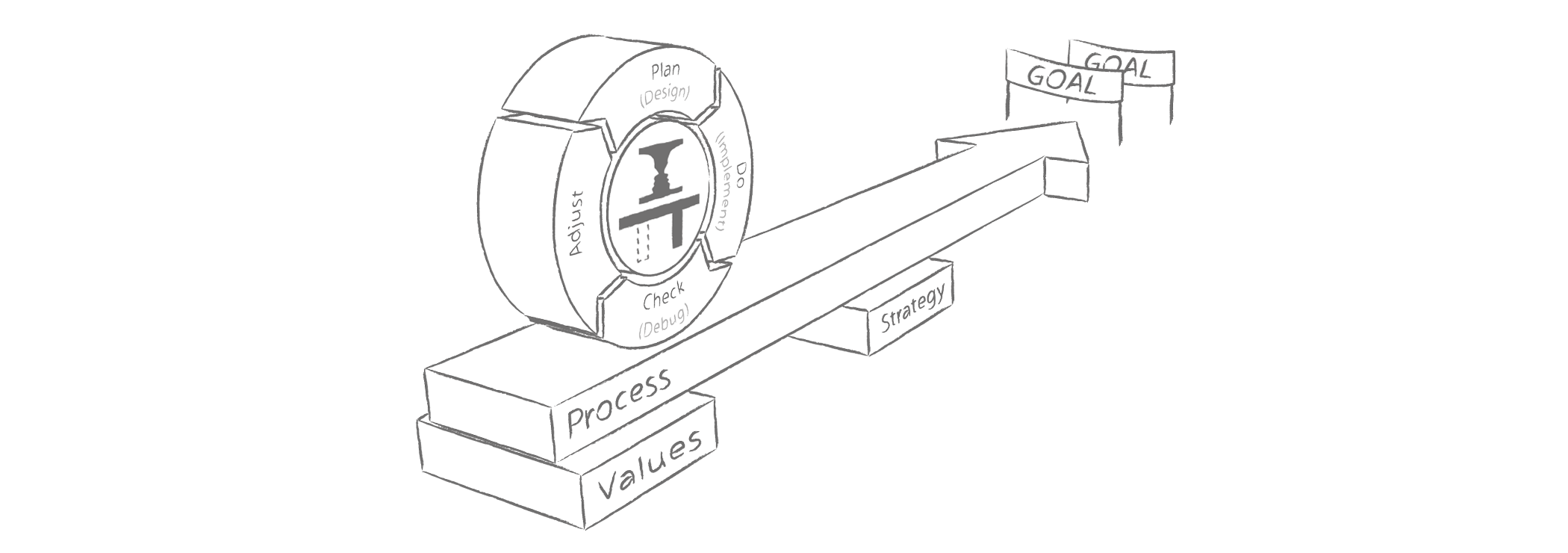What defines a Good Engineer?
Time to Read 3 min
Apart from technical knowledge, what are the key success factors of an engineer ? This was the question I asked myself, especially how to illustrate such a concept in a concise way.
Which Concepts are Useful?
There are many concepts, as always I borrow whatever is useful to our company. I wanted to have feedback included, something like the PDCA circle for continuous improvement, processes for the repetitive tasks, creativity for the new tasks. For the latter the creativity definition of Gerhard Roth (after Asendorp, in "Fühlen, Denken, Handeln") struck me as important for an engineer, especially the part about flexibility of thinking, change of the frame of reference and finding of alternatives. Then I wanted to include the T-shaped skills concept of Tim Brown. And maybe the most important skill is to be able to cope with the fact that there are no solutions without trade-offs.
What is the Synthesized Picture?
The synthesis of all this is the graphics above (the "PDCA snail"):
Feedback
The wheel of PDCA can only roll without bumps if all four segments are present. Do and Check (which on some level are equivalent to implement and debug) are the activities that are done by all engineers. We strongly believe that also to Plan what to do (and how to check what was done) is very important. But do not execute the same thing in the same wrong way twice, so it is even more important to Adjust the next plan based on the experience (check) of last time.
Summing up this means that on all levels of the company we want feedback, i.e. learning: for each engineer individually, within each task and subtask, within each project and also for the overall company we ask PDCA circles to be lived.
Processes
The PDCA wheel rolls on our common processes which are designed to make standard tasks more efficient in order to free energy and time for creative engineering work. The processes themselves are based upon our values and our company strategy.
Trade-Offs
All our work rolls towards a goal or rather several goals. In engineering there is never only one goal flag, the project always must pass between several goalposts. In each project at least two goals always exist that have to be traded off against each other: one is effort, the other is quality. What we expect from an engineer is not excuses why this lasted longer or why it is badly designed, but creative solutions to be fast and good at the same time. One example of such a creative solution is the use of code generators to provide high quality code with less overall effort than manual implementation for e.g. communication stacks.
Skills & Creativity
What about the strange axis around which the PDCA wheel turns? This is the core of the engineer's success:
The "one legged table" is the symbol for the skills and knowledge we need. The leg representing the deep vertical knowledge of a specialty (or two for some engineers). The horizontal tabletop represents a broad but shallower set of interests to allow the communication with other specialists. Several of those engineers can then cover the full depth and breadth of a project.
On the table you see a strange "vase" ...or is it two heads facing each other? This picture represents the essence of creativity in two ways, on one hand it can itself be seen from two viewpoints, on the other hand one of the viewpoints shows that everything can be seen at least from left and right. A good engineer is able to generate several models for every issue, e.g. in electronics in the time domain, frequency domain, as a formula etc.; in software as a sequence chart, a state machine, a class diagram etc.
What is the Use of the PDCA Snail?
With current and future engineers we use this illustration to discuss the skills we expect from them apart from their technical specialties and the adherence to our values.
And yes, one last thing: why is it a snail? Because this kind of skills do not come fast, a lot of burdensome work is needed to reach the required level.
Andreas Stucki
Do you have additional questions? Do you have a different opinion? If so, email me or comment your thoughts below!

